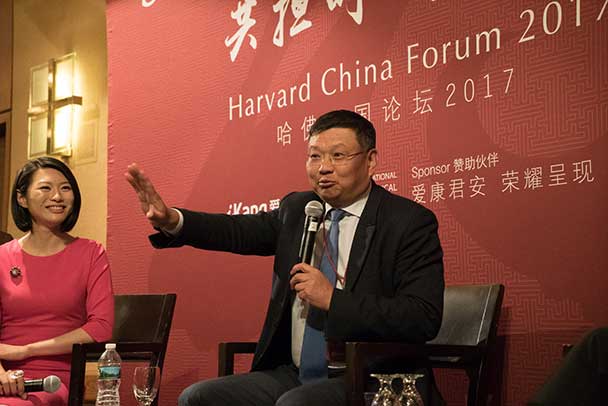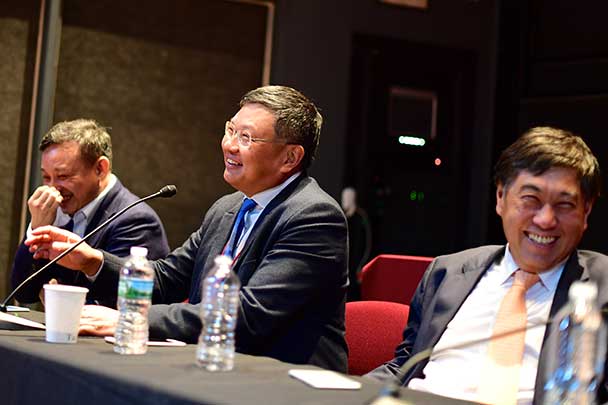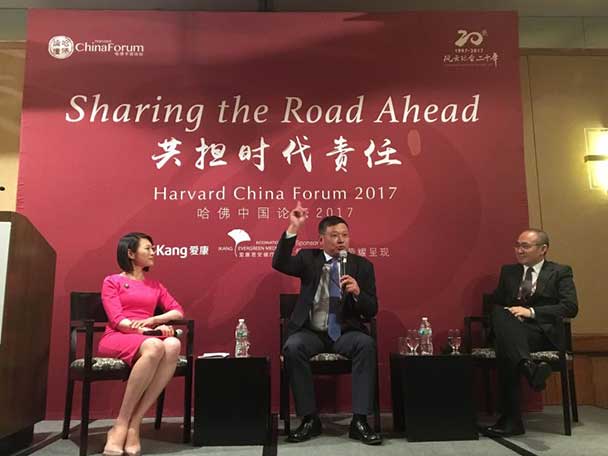Dr Xiang: China and US shoulder responsibility to address shortcomings of globalization
Dr Xiang Bing (pictured below), Founding Dean of Cheung Kong Graduate School of Business and Professor of Chinese Business and Globalization, spoke as a keynote speaker at the prestigious Harvard China Forum during which he offered insightful analysis both on the current state of the global economy and on the prospects for Sino-US relations.

The 20th Harvard China Forum, held recently at Harvard University, is recognized as an effective and compelling platform to discuss, analyze and explore the most critical topics and developing trends. It attracts high profile and influential politicians, businesspeople and academics from China and the US. This year, the Forum, titled “Sharing the Road Ahead”, evaluated the prospects for cooperation between China and the US and analyzed topical issues such as bilateral trade, innovation, entrepreneurship and cultural exchanges.
During his keynote speech and, later, during the panel discussions, Dr Xiang explained that today’s economic achievements and challenges are largely a result of neoliberalism that has shaped the economic policies of the last four decades. Fundamentally, he said, the economic model employed during this period has created considerable wealth, but it has also led to an imbalanced distribution of income and wealth. As a result, neoliberalism adopted by the US, the UK and China has given birth to vocal anti-globalization sentiments.
Dr Xiang further explained that China and the US embraced neoliberalism, under which trade barriers were largely removed and governments increasingly allowed free enterprise and private sectors to flourish. As a result, the United States and China led the world to new heights in global trade and commercial ties. But now the two economic powerhouses, Dr Xiang said, must cooperate to overcome the challenges that have been created as a product of it, as well as promote its benefits.

The need for reform, Dr Xiang said, has become urgent as some of the outcomes of globalization and neoliberalism potentially pose a risk to stability. In this environment, he continued, China and the US, as the two largest economies in the world, carry a burden that require both countries to cooperate and complement each other in order to meet the common challenges of the world and ensure optimal benefits for humanity.
“This might be the first time that mankind has been confronted with so many revolutionary changes. Therefore, as important players in the world, China and the US should work together to shoulder mankind’s responsibilities. As recently noted by Chinese President Xi Jinping, China has thousands of reasons to maintain good relations with the US and none to sabotage them, so cooperation is the only correct choice for China and the US. Cooperation would help to solve the issues and challenges facing the two countries and the wider world. Essentially, cooperation is the call of duty in our times,” Dr Xiang said.
Dr Xiang expanded on his insight during the panel discussion “Economy and Finance: Trade Cooperation and Protectionism” with Zhu Yunlai, a finance expert; Li Daokui, Chair Professor of Freeman Economics at Tsinghua SEM; Mao Zhenhua, Founder and Chairman of CCXI Group; and Wang Boming, editor-in-chief of Caijing magazine.
Innovation Vital for China
At the closing ceremony of the Forum, Dr Xiang spoke on a panel with Pan Shiyi (below), Chairman of SOHO China, about entrepreneurship, entrepreneurial innovation and social responsibility and the two exchanged views on the prospects for, and aspirations of, today’s youth.

Dean Xiang said that China’s rise in global leadership requires Chinese to be innovative. “When China began opening its economy, loosening control and relaxing regulations, the most successful business models were those that replicated ones from the western world. This is not unusual: the US, Japan and South Korea also followed this path when they began their own industrialization processes. However, the stage of development that China has achieved now requires domestic innovation for continued successes,” he said.
He noted that China contributed about 35% to the world’s economic growth. If China were to maintain its actual economic growth rate of 6%, it would remain the driver for global economic growth. Keeping this level of growth is not unrealistic, Dean Xiang said, considering that China continues to experience rapid urbanization, a growing middle class and rising consumption, all of which offer great and growing opportunities for enterprises.
Responsibility and China’s Leadership Position
Dr Xiang also noted that CKGSB teaches its students to think beyond simply generating profits, with the school pioneering the integration of the humanities into its business curricula in 2005, as well as introducing some compulsory philanthropy modules in recent years.
During his address at the Forum, Dr Xiang urged Chinese enterprises to use their assets and innovative ideas to solve social challenges. He also called on the next generation to take a wider interest in adopting a global vision, to work towards integrating global resources and to shoulder global responsibilities.
“If more entrepreneurs would start businesses or are innovative for purposes other than making profits, our entrepreneurship and innovation would certainly have a brighter future,” Dr Xiang said.
He added: “We Chinese must make it our own responsibility to solve global issues and contribute to the world our own Adam Smith and David Hume. If we achieve this, a rising China would also earn greater global respect.”
The Forum “Sharing the Road Ahead,” is the 20th Harvard China Forum. Held on April 21-23 at Harvard University, it was attended by Chinese and American entrepreneurs, scholars, political leaders, journalists and students from top universities such as Harvard, Yale and Columbia. Dr Xiang’s keynote speech at the Forum, made on behalf of Chinese scholars, followed his meeting with Dr Henry Kissinger to discuss Sino-US relations under the presidencies of Donald Trump and Xi Jinping, his participation at the annual “Committee of 100” meeting to tell the stories of China, as well as other major Sino-US academic and diplomatic events.
The student-run Harvard China Forum, held annually at Harvard University every April, is the longest-running summit on China in North America. The forum provides a platform for constructive dialogue and in-depth discussion about the challenges, issues and trends in China. It aims to challenge the traditional views of attendees about China and encourage them to make contributions for a brighter future. This year’s Forum was attended by many influential figures, including Zhang Meifang, Deputy Consul General of the Consulate General of the People’s Republic of China in New York; Stephen Orlins, President of the National Committee on US-China Relations; Hank Paulson, former US Treasury Secretary; Mark C. Elliott, Vice Provost of Harvard University; Graham Allison, Founding Dean of the Harvard Kennedy School; Xu Chen, Chairman of the China General Chamber of Commerce in the US; Tad Smith, President and CEO of Sotheby’s; Guo Guangchang, Chairman of Fosun Group; Peng Lei, Chairman of Ant Financial; Lei Jun, Chairman and CEO of Xiaomi; Pan Shiyi, Chairman of SOHO China; Zhang Shou-cheng, Physics Professor of Stanford University; Li Daokui, Chair Professor of Freeman Economics of Tsinghua SEM; and finance expert Zhu Yunlai.